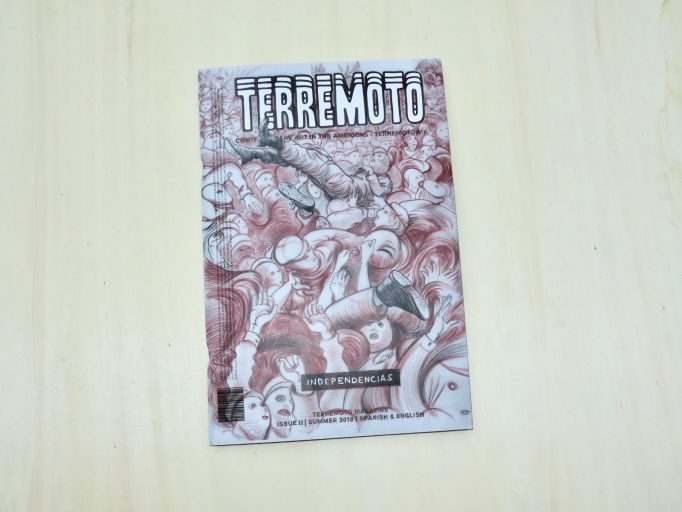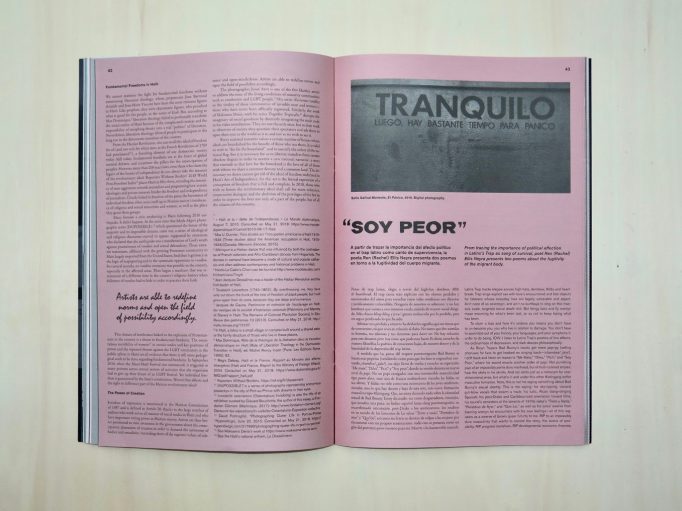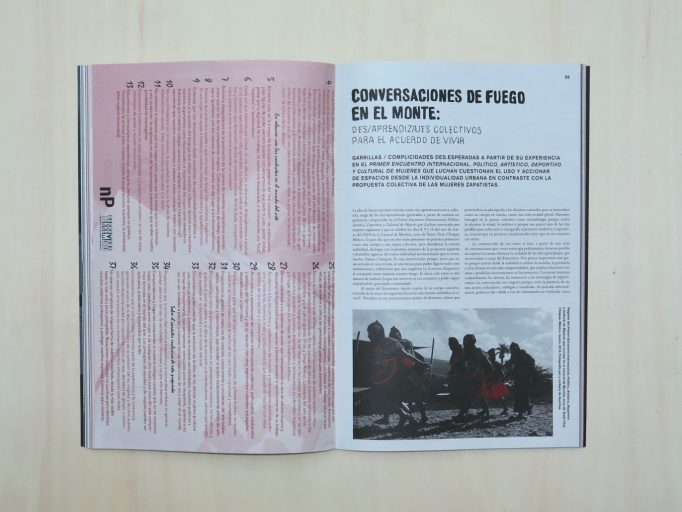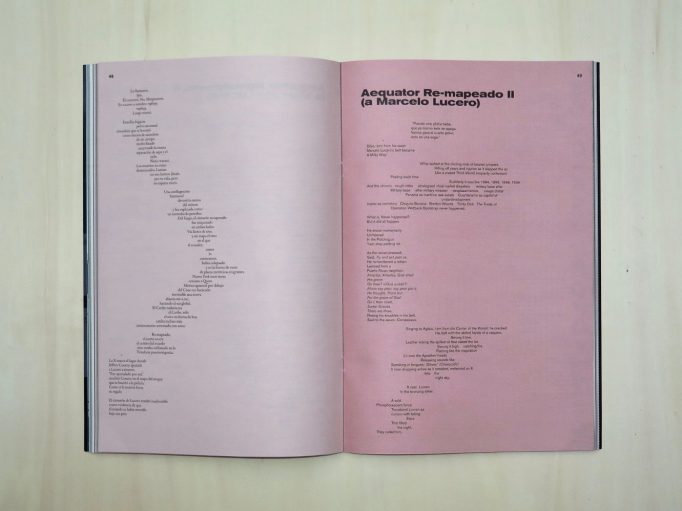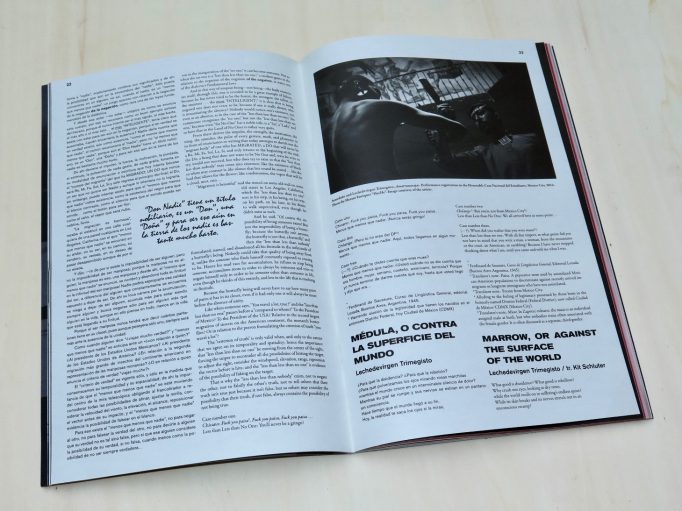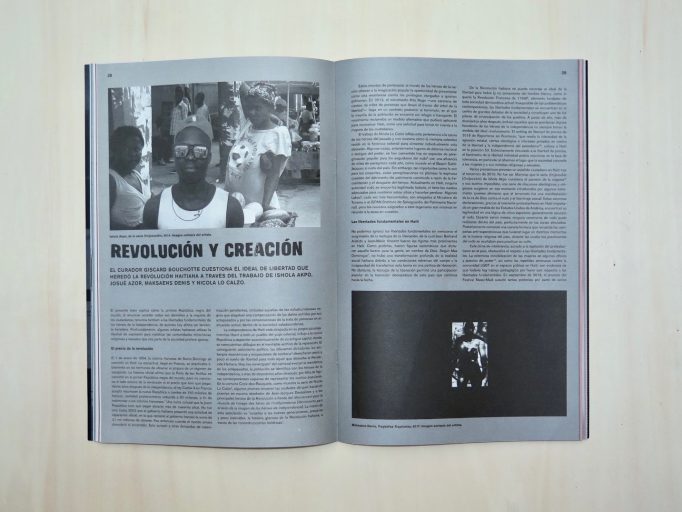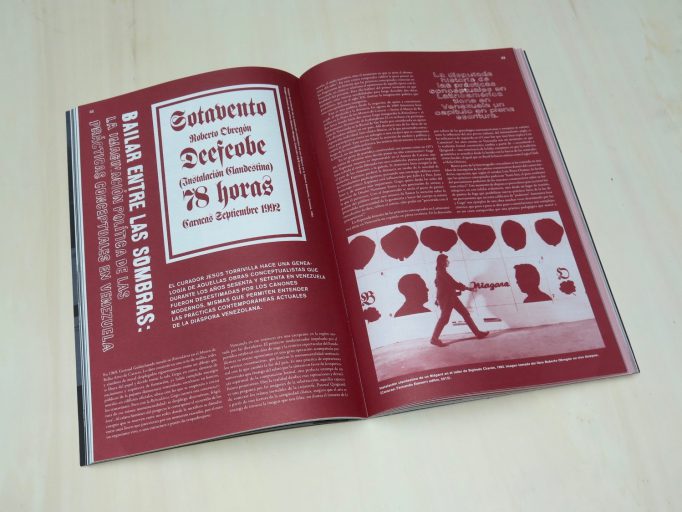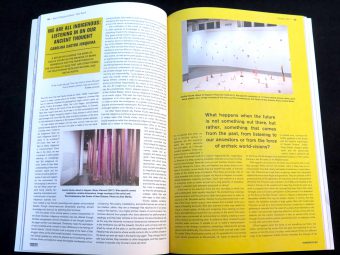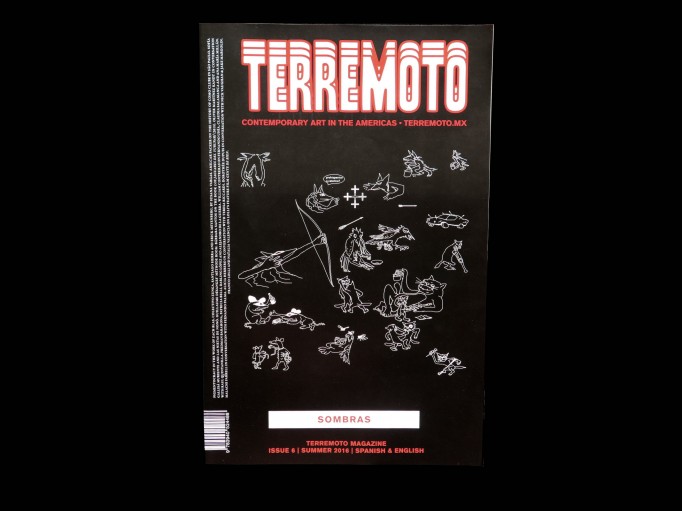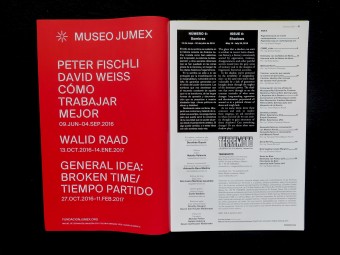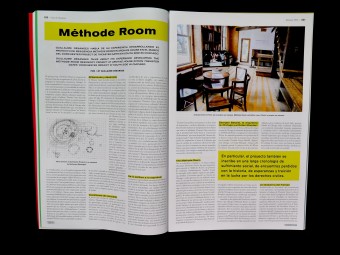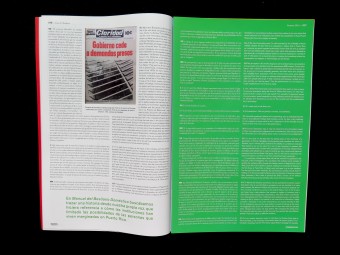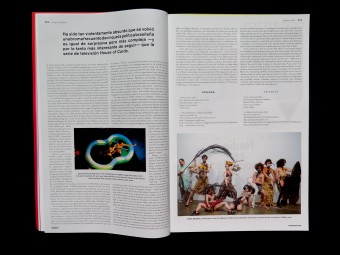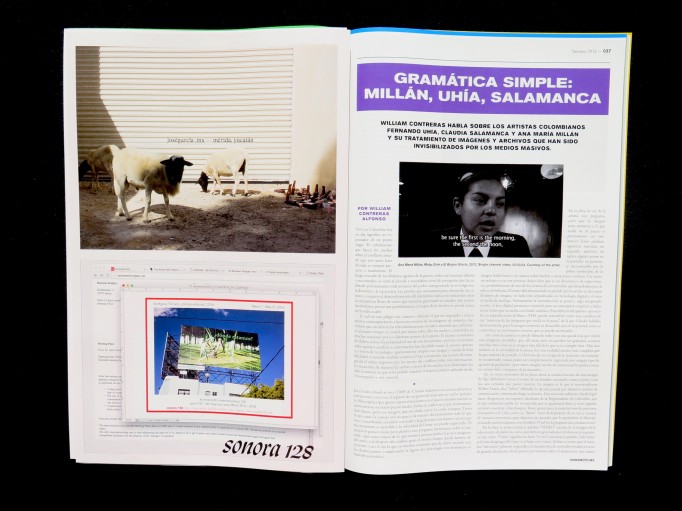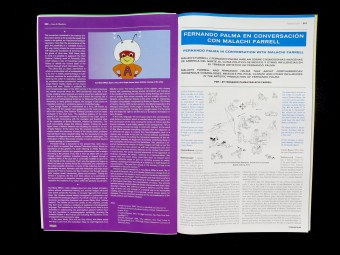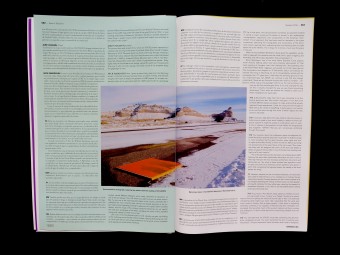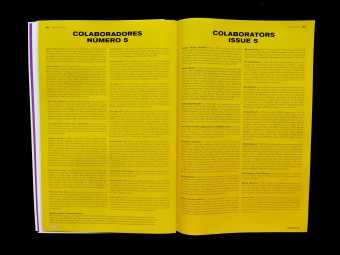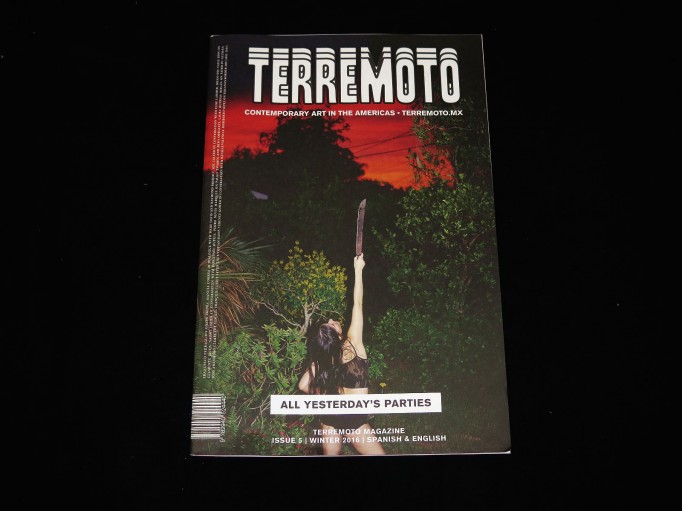

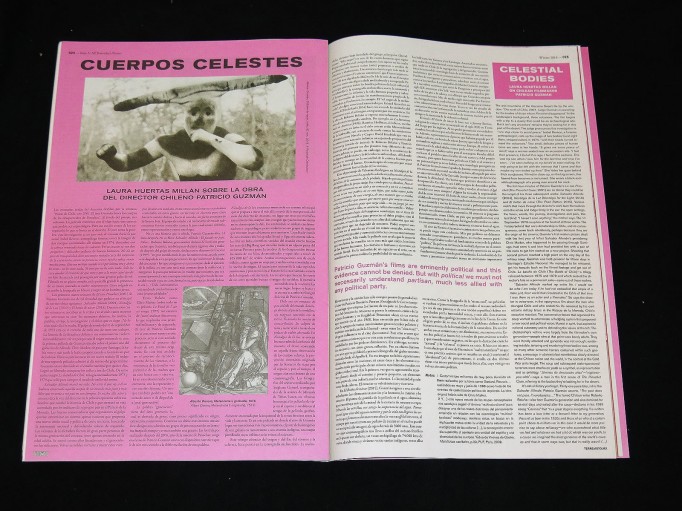
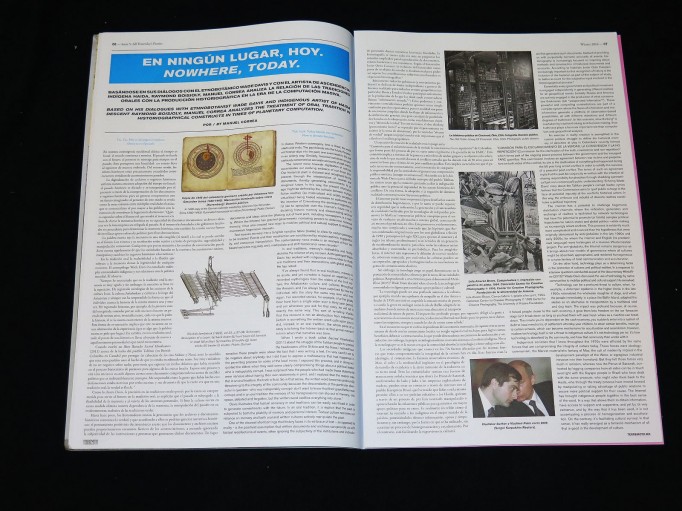
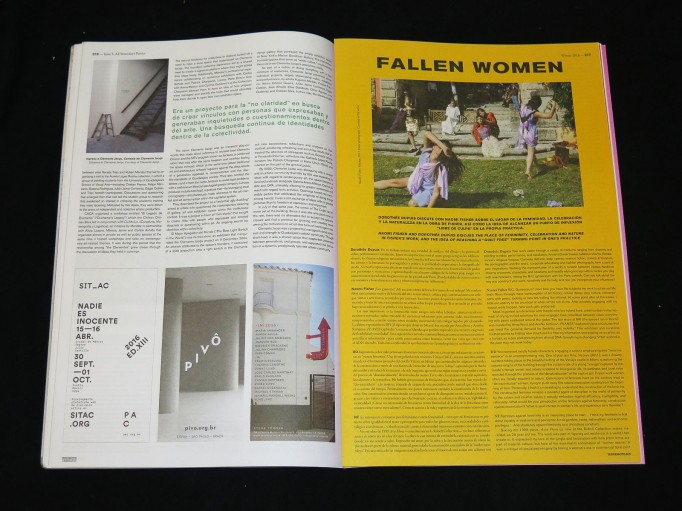
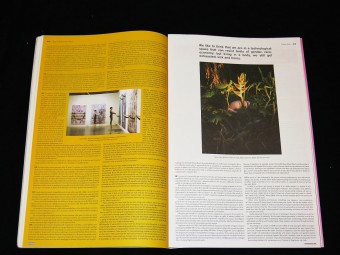
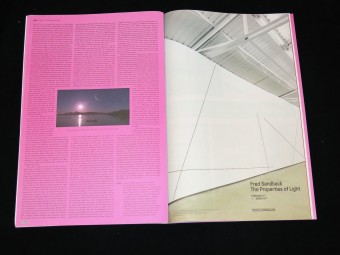
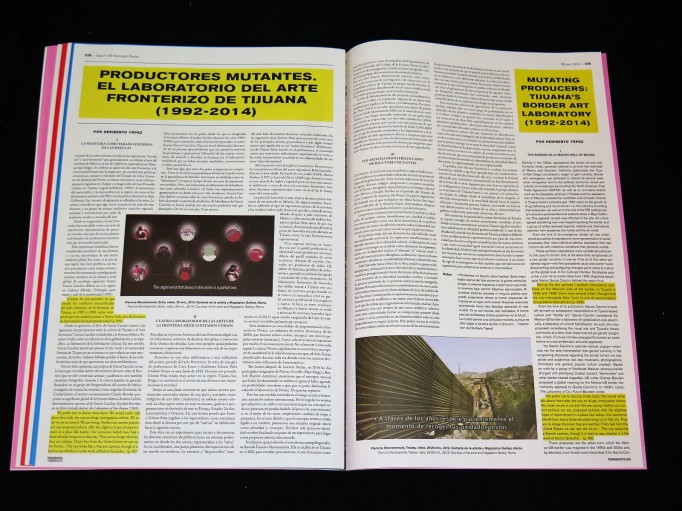
Terremoto 5
Winter 2016
COLOPHON
FRANCESCO PEDRAGLIO’S PÁJARO PIEDRA. MANUEL CORREA IN DIALOGUE WITH WADE DAVIS AND RAYMOND BOISJOLY. SOL CALERO IN CONVERSATION WITH ELISE LAMMER. DIEGO DEL VALLE RÍOS ON CLEMENTE JACQS. NAOMI FISHER IN CONVERSATION WITH DOROTHÉE DUPUIS. PEDRO NEVES MARQUES ON PAULO TAVARES AND BETO SHWAFATY. LAURA HUERTAS MILLÁN ON PATRICIO GUZMÁN. JOSÉ ARAMBURO CLIMBS THE SUMMIT. FRANÇOIS CUSSET AFTER THE UTOPIAN SLEEP. TERENCE GOWER ON CONVERSATION WITH NATALIA VALENCIA. HERIBERTO YEPEZ ON TIJUANA’S BORDER ART [1992-2014]
INDEX
Pájaro piedra: En retrospectiva, esto te parecerá hermoso / Pájaro piedra: One day you’ll find this beautiful
Por / by Francesco Pedraglio
En ningún lugar, hoy: internet, oralidad e historiografía. Manuel Correa en diálogo con Wade Davis y Raymond Boisjoly / Nowhere, today: internet, orality and historiography. Manuel Correa in conversation with Wade Davis and Raymond Boisjoly
Por / by Manuel Correa
¿Cuál es la esencia del Caribe? Elise Lammer y Sol Calero hablan sobre la crítica de la exotización tropical y caribeña en la práctica de la artista / What is the essence of the Caribbean? Elise Lammer and Sol Calero discuss the artist’s critique of tropical and Caribbean exoticization
Por / by Elise Lammer & Sol Calero
Clemente Jacqs no es una salsa catsup: sobre un laboratorio de experimentación visual que operó en Guadalajara en los 2000’s / Clemente Jacqs is not a brand of ketchup: about a visual experimentation laboratory in 2000’s Guadalajara
Por / by Diego del Valle
Mujeres caídas: Naomi Fisher sobre el lugar de la feminidad, la celebración y la naturaleza en su obra, en conversación con Dorothée Dupuis / Fallen Women: Naomi Fisher on femininity, celebration and nature in her work, interviewed by Dorothée Dupuis
Por / by Dorothée Dupuis
Brasil, medio ambiente mortal: sobre el trabajo del artista Beto Shwafaty, el arquitecto Paulo Tavares, la amazonía y el desarrollismo. / Brazil, Deadly Environment: about the work of artist Beto Shwafaty and architect Paulo Tavares, “developmentism” (desinvolvimentismo) and Amazonia.
Por / by Pedro Neves Marques
Cuerpos celestes: Laura Huertas Millán sobre la obra del director chileno Patricio Guzmán Celestial Corpses: Laura Huertas Millán on Chilean filmmaker Patricio Guzmán
Por / by Laura Huertas Millán
Escalando la cima: triunfos y derrotas de una resaca bogotana / Climbing the summit: triumphs and defeats of a Bogotá hangover
Por / by José Aramburo
Después del sueño utópico: resistiendo la resaca de la pesadilla ideológica de nuestros tiempos neoliberales / After the Utopian Sleep: an attempt to resist the hangover born from the ideological nightmare of our current neoliberal times
Por / by François Cusset
Terence Gower y Natalia Valencia hablan sobre la abstracción y la resaca arquitectónica /Terence Gower and Natalia Valencia discuss abstraction and the architectural hangover
Por / by Natalia Valencia
Productores mutantes: El arte fronterizode Tijuana 1992-2014 / Mutant productors : Art from the border in Tijuana 1992-2014
Por / by Heriberto Yépez
EDITO
SPANISH
Todas las Fiestas del Ayer
11 de enero – 28 de marzo de 2016
La resaca es un estado alterado, tan absorbente y alucinante como la embriaguez. Ambivalente e impredecible, puede producir depresión u optimismo irracional; puede liberarnos del temor y prolongar la euforia de una celebración, o simplemente aumentar la paranoia de Esta Inminente Fatalidad. A medida en que el mundo se vuelve cada vez más injusto, intolerante y amnésico, abordaremos preocupaciones relacionadas con los giros cada vez más conservadores de nuestras sociedades por medio de múltiples aproximaciones a los recuerdos borrosos de las fiestas del ayer.
Con esta edición celebramos un año de supervivencia en el mundo editorial independiente, permitiéndonos una cierta complacencia en este estado alterado de euforia culpable, anticipando el inevitable fracaso de algunos de nuestros planes y utilizando la resaca como metáfora de la desilusión generada por los ideales rotos. Si, como evoca Clarice Lispector, “La belleza de Brasilia son sus estatuas invisibles”, queremos enfatizar precisamente en el aspecto más real de la utopía: su dimensión imaginaria.
A través de una variedad de voces, historias y conversaciones que reflejan este bucle mental de placer y ansiedad, esta edición discutirá las posibles motivaciones que harán que valga la pena la próxima celebración, así nos produzca resaca una y otra vez.
EDITO
ENGLISH
All Yesterday’s Parties
January 18 — March 28, 2016
The hangover is an altered state, as absorbing and mind-bending as drunkenness. Ambivalent and unpredictable, it may depress you or, on the contrary, infuse you with irrational optimism. It can free you from fear, prolonging the euphoria of a celebration, or it might just increase the paranoia of this impending doom. As the world becomes increasingly more unjust, intolerant, and amnesiac we’ll address current concerns related to the conservative turn of society by means of manifold approaches to the hazy memories of yesterday’s parties.
With this issue, the magazine celebrates one year of survival in independent publishing by reveling on this altered state of guilty euphoria, anticipating the inescapable failure of some of its future plans–using the hangover as a metaphor for the disillusion brought by broken ideals. If, as Clarice Lispector evoked, “The beauty of Brasilia is its invisible statues”, we will emphasize the imaginary dimension of utopia, which is by definition it’s most real aspect.
Through a variety of voices, tales, and conversations reflecting on this mental loop of pleasure/ withdrawal the issue will discuss the possible drives that make the next celebration still worth it, may it have us wake up hung-over, time and again.
TERREMOTO
Contemporary Art in the Americas
.
Baja California 64-F, Roma Sur
06760 Ciudad de México, México,
Tel. + 52 55 70364603.
terremoto.mx / magazine@terremoto.mx.
Terremoto es una publicación trimestral bilingüe sobre arte contemporáneo en las Américas, publicada y distribuida por / Terremoto is a quarterly, bilingual publication about Contemporary Art in the Americas, published and distributed by:
En México, Latinoamérica y Estados Unidos:
Temblores Publicaciones S.A. de C.V. Baja California 64-F, Roma Sur, 06760 Ciudad de México, México Tel. +52 55 70364603. distribution@ terremoto.mx.
En Europa, Nueva York y Canadá:
Motto Books: www.mottobooks.com www.mottodistribution. com stores@mottodistribution.com.
Impreso a 4000 copias el 25 de febrero de 2016 por / Printed in 3000 copies by: Realización Gráfica Torquemada 103B Col. Obrera, México D.F. Derechos reservados. Se prohíbe la reproducción total o parcial del contenido por cualquier sistema o método incluyendo electrónico o magnético sin previa autorización del editor. No nos hacemos responsables por material no solicitado. / All rights reserved. Without the explicit authorization of the editors, no text published in Terremoto can be reproduced. Terremoto is not responsible for any material delivered by its writers without the consent of their authors. www.mottobooks.com
Published by Terremoto and Motto Books
ISBN: 978-2-940524-42-6
Foto de portada / Cover image:
Naomi Fisher, You know that it’s real if you feel that it’s real, 2013. Cibachrome, 50 x 60”. © Naomi Fisher.
8 €
buy it
